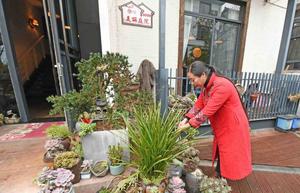 A villager in the Dechen Tibet autonomous prefecture, Yunnan province, tidies up a homestay in his village, which is booming with rural tourism. (HU CHAO / XINHUA)
A villager in the Dechen Tibet autonomous prefecture, Yunnan province, tidies up a homestay in his village, which is booming with rural tourism. (HU CHAO / XINHUA)
Accommodation hosts on the China branch of US-based Airbnb, a vacation rental website-cum-app, bring considerable economic benefits and employment to their local community, the company's new survey of both hosts and guests found.
Besides, hosts double up as "travel influencers", educating their guests about the most authentic ways to enjoy destinations.
This enlightened, sophisticated approach to boosting travel and tourism is made possible by the fact that about 82 percent of Airbnb's hosts in China hold other jobs.
And 90 percent of them hold bachelor or postgraduate degrees and work in industries like arts and entertainment, internet, and real estate, according to the Airbnb survey report.
Chris Zhang, Airbnb China supply lead, said the company will continue to actively empower the host community with its global network, technologies and products, so that they can create a sense of belonging among travelers, and generate greater social and economic value for the local community
More than 90 percent of hosts among survey respondents said they made at least one recommendation to their guests last year.
Typically, hosts on the short-term lodging website/app recommend tourist attractions, activities, restaurants and experiences in the neighborhood. About 90 percent of the businesses recommended by hosts are locally owned, and 91 percent are located in the neighborhood of the listings.
For instance, Guo Qi, a professional architectural designer in Chengdu, capital of Sichuan province, and his wife, who have listed their property on Airbnb, often recommend attractions and restaurants in and around Chengdu to their guests.
"I hope we can make our guests comfortable and cozy during their stays and let them experience quality leisure time in Chengdu," Guo said.
And 79 percent of guests who took part in the survey said they visited the places recommended by their hosts, Airbnb said.
The top reason why Chinese hosts list their residences or rooms for short-term rental on Airbnb is "to earn extra spending money".
ALSO READ: Orchard gives welcome boost to farmers' incomes
By opening their doors to guests, most hosts on Airbnb think they can "meet new people" and "get to know other cultures".
Some hosts spend the money earned from Airbnb listings on vacations themselves as well as on home renovations, education and activities related to post-retirement life, the report noted.
 A homestay owner in Tiantai county, Taizhou, Zhejiang province, cleans up the courtyard of her facility. (WANG HUABIN / FOR CHINA DAILY)
A homestay owner in Tiantai county, Taizhou, Zhejiang province, cleans up the courtyard of her facility. (WANG HUABIN / FOR CHINA DAILY)
In addition, during the first wave of COVID-19, Chinese hosts actively sought innovative ways to overcome pandemic-related challenges.
That's not all. They capitalized on new travel trends like mid-and long-term rentals, upgrading listings, providing experiences and innovating new listing products.
About 90 percent of surveyed hosts are highly or very willing to continue as hosts on Airbnb this year, and will keep improving listing quality and operations, the vacation rental website app said.
Some 550 hosts were interviewed in November 2020, including amateurs and professionals with a minimum experience of six months on Airbnb.
Chris Zhang, Airbnb China supply lead, said the company will continue to actively empower the host community with its global network, technologies and products, so that they can create a sense of belonging among travelers, and generate greater social and economic value for the local community.
China's short-term vacation rental sector has seen a steady recovery from the impact of the pandemic. Travels to nearby destinations and rural areas, countryside homestays, and clean and high-quality accommodations have become popular.
Short-haul trips will likely become the norm in the short term, while rural tours may become an increasingly popular choice, said Peng Tao, president of Airbnb China, in an earlier interview before the resurgence of the novel coronavirus in some parts of the country.
Cleanliness and hygiene at accommodations will be a top priority for Chinese tourists, he had said.
According to a report from the Sharing Economy Research Center, which is part of the State Information Center, the revenue of the country's homestay services sector reached 22.5 billion yuan (US$3.5 billion) in 2019, up 36.4 percent year-on-year.
Lai Zhen, an analyst at market consultancy iResearch, said short-term home rentals and homestay services are wide-ranging to satisfy the needs of various kinds of tourists.
"Typically, customers hire such services for get-togethers, reunions, team-building activities and to improve parent-child bonding and communication," Lai said.


